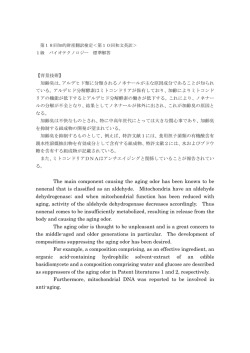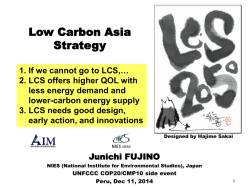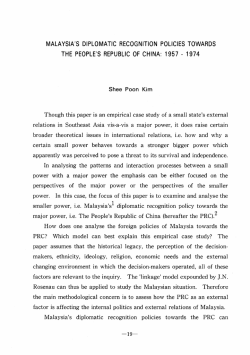
Modulated rate – dependent strain hardening of Ag/Bi2223
科学技術人材育成費補助金 テニュアトラック普及・定着事業 Modulated rate – dependent strain hardening of Ag/Bi2223 composite wire with a low – strength AgMg alloy matrix 講師:Dr. 講師: Malik Idries Adam( (Universiti Tenaga Nasional, Malaysia) ) 主催:サステナブル・ディベロップメント実践研究センター 日時:平成26 日時:平成26年 26年3月26日( 26日(水 日(水)11時~ 11時~12 時~12時 12時 場所:先端物質科学研究科 場所:先端物質科学研究科 402N号室 402N号室 The strain hardening and the pre-compressive forces exerted on the ceramic filaments in Ag/Bi – 2223 composite wire is analysed and discussed in detail. Tensile stress–strain, , hardening – relaxation , and transport current analysis were carried out on specimens from the wire at 77 K. Strain hardening analysis is controlled such that the applied stress is released at the stress value normally used for the calculation of the composite modulus of elasticity. A biexponential model is employed to further analyse the relaxation data. Two well separated decaying parameters indicate that there are two competing mechanisms in the composite wire. We relate this behaviour to elastic relaxation in the metal matrix whereas the Bi – 2223 filaments relax through microscopic length reduction when the composite wire is in the elastic state of deformation. However, when the composite experiences plastic deformation, plastic flow in the low – strength metal matrix accompanied by successive fracture in the ceramic filaments was found. Since there was no systematic transition in the deformation states of the wire, data were further analysed by a rate – dependent power – law hardening of the Ramberg – Osgood type. The enormous effect of the strain hardening has manifested in a hysteretic form of strain rate distribution over the flow range where the stress on the composite is found to repetitively buckle down to about 96%. The highest attainable residual strain is therefore used to estimate the intrinsic strain in Bi – 2223 filaments when the precompressive stress is completely depleted. Dr. M I. Adam currently works as a Senior Lecturer at the Department of Mechanical Engineering, Universiti Tenaga Nasional, UNITEN in Malaysia. He received his PhD in Magnetic Materials & Superconductors from University Putra Malaysia in 2003. In 2004 – 2005 he was a post doctoral research fellow at the Department of Materials Science and Engineering, Kyoto University, Japan. His previous employers include University of Technology PETRONAS, University Putra Malaysia, and University of Malaya in Malaysia. His research interests lie in the domain of electro – active ceramics which includes superconductivity, magnetoelectricity, and multiferroicity. He is also interested in modeling and simulation of the physics behind these exotic materials. URL: http://www.researcherid.com/rid/F-4050-2011 Attention! This talk will be in English 講演は英語、質疑は日本語も可能です 講演は英語、質疑は日本語も可能です
© Copyright 2026


